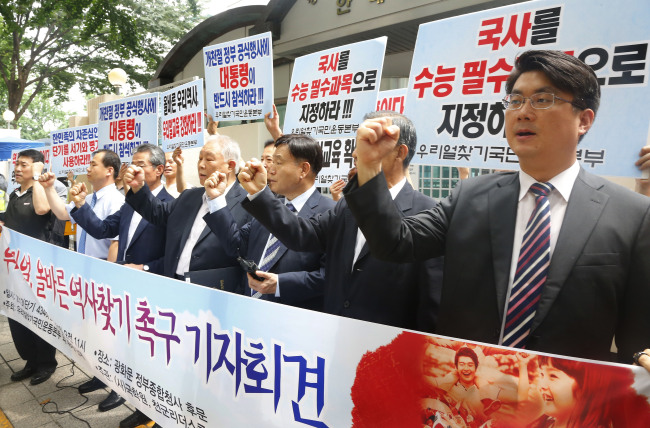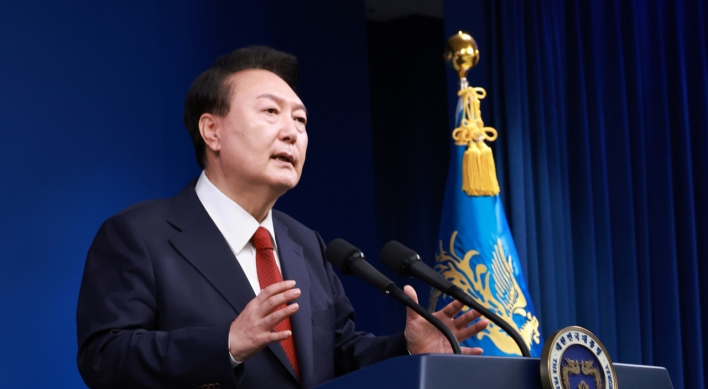Concerns mount over school history education
Government, ruling party vow to test all students on history for college admission
By Korea HeraldPublished : July 31, 2013 - 19:25
The government and ruling party on Tuesday vowed to enhance history education at public schools by making the subject compulsory for college admission.
A number of ways discussed at the government-ruling party meeting include making the subject compulsory on the College Scholastic Ability Test or asking students to submit scores from the National Korea History Test when applying to colleges.
The government is also looking to extend history classes at schools and develop a new national history test as a requirement for graduation.
The Ministry of Education said it is looking at several options before making a final decision by next month at the earliest.
The decision came after President Park Geun-hye said recently that she was worried about young generations’ increasing ignorance of the country’s history.
“The history of a country is like the soul of the people, and one that grows without proper knowledge of history might become a person without a soul,” Park said. The president quoted a local survey that showed that nearly 70 percent of high school students believe the Korean War (1950-1953) was started by a South Korean invasion of the North.
Park laid some blame for the misconception on waning history education, urging the government to take steps to enhance history class at schools.
Her remark has sparked debate over whether Korean history should be a compulsory subject on the College Scholastic Ability Test.
Some experts believe requiring all students to take a history test for college admission might help students learn the subject more thoroughly.
The opposition, however, claims that it may only add more pressure on students who are already under enormous stress from cutthroat competition to enter college. They also cite side effects, such as rising private education costs.
A number of ways discussed at the government-ruling party meeting include making the subject compulsory on the College Scholastic Ability Test or asking students to submit scores from the National Korea History Test when applying to colleges.
The government is also looking to extend history classes at schools and develop a new national history test as a requirement for graduation.
The Ministry of Education said it is looking at several options before making a final decision by next month at the earliest.
The decision came after President Park Geun-hye said recently that she was worried about young generations’ increasing ignorance of the country’s history.
“The history of a country is like the soul of the people, and one that grows without proper knowledge of history might become a person without a soul,” Park said. The president quoted a local survey that showed that nearly 70 percent of high school students believe the Korean War (1950-1953) was started by a South Korean invasion of the North.
Park laid some blame for the misconception on waning history education, urging the government to take steps to enhance history class at schools.
Her remark has sparked debate over whether Korean history should be a compulsory subject on the College Scholastic Ability Test.
Some experts believe requiring all students to take a history test for college admission might help students learn the subject more thoroughly.
The opposition, however, claims that it may only add more pressure on students who are already under enormous stress from cutthroat competition to enter college. They also cite side effects, such as rising private education costs.

A number of politicians have already jumped into the fray by proposing a revised Higher Education Act, which will put history on the list of mandatory subjects, along with Korean, math and English, and require all colleges use the test scores for admission, starting from 2017.
“Youths now learn our history from television dramas and from websites, which can be very troublesome. We must include history as a compulsory subject in the state-administered college entrance test in order to enhance history education,” said Rep. Yoo Ki-hong of the Democratic Party, who spearheaded the proposal.
The proposals come amid growing public concern that young people do not have a proper understanding of history. A recent poll by the Korea Federation of Teachers’ Associations shows that nearly nine out of 10 teachers are concerned about students’ perceptions of history, with 80 percent calling for allocating more hours for history class at schools.
And more than half of those 1,600 respondents cited the need for making history one of the core subjects for the college entrance exam, according to the KFTA.
Ahn Yang-ok, president of KFTA, claims since the government had made Korean history optional on the CSAT in 2005, it had became less and less feasible for students to choose the subject.
Currently, students are allowed to choose two of 10 optional subjects, including Korean history, world history, geography, economics and politics, for the CSAT’s social studies section.
He pointed out that only 7.1 percent of high school students opted to take Korean history last year, down from 27.7 percent in 2007.
“Students have declined to learn Korean history partly because it is an optional test subject. Under the current circumstances, it may not be possible to encourage students to take interest in history unless we link the subject to college admission,” he said.
Some, however, insist that the idea of making history a compulsory test doesn’t help students learn more thoroughly, nor boost students’ interest.
Critics are also concerned that it may turn more students to private tutoring, in stark contrast to the Park administration’s plan to curb rising private education costs.
Lee Yun-ho, professor of social studies education at Suncheon National University, said it was not necessary to make all students take history on the CSAT.
“The purpose of the (CSAT) test is to measure basic knowledge of students required to advance to colleges. I don’t think a shortage in the understanding of history makes them unable to major in subjects like math, biology and chemistry.”
Lee, who chairs the Korean Association of Social Education, also pointed out that students already dedicate sufficient hours to history studies.
“Students spend more than 255 hours in history class from middle to high school. It’s significant, even compared to other industrialized nations ― enough to teach students the necessary knowledge,” Lee said.
The problem is not how many hours students sit in class, but how they are taught, he added, since teachers still tend to cram students with knowledge.
“Students are still asked to answer questions, like when the Korean War began, which can be searched by a few clicks on a smartphone.”
Students should aim for meaning and depth, rather than memorizing dates and figures, if Korea is to improve its history education and arouse students’ interest in the subject, he added.
Yoon Young-sun, secretary-general of a cultural conservation group called Moonhwa Sallim, also stressed the need to adopt innovative teaching methods to help young pupils get interested in history.
The agency has been organizing field trips and developing new curriculum and teaching materials with teachers to help students get a better grasp of history.
“We’ve been helping students engage in many activities to boost their interest in history. But it’s difficult sometimes as there are a limited number of teachers, and their heavy workload makes them unable to focus on teaching,” Yoon said.
“Pupils need to understand that history is not just enjoyable, it is important,” she added.
By Oh Kyu-wook (596story@heraldcorp.com)
-
Articles by Korea Herald









![[KH Explains] Can tech firms' AI alliances take on Nvidia?](http://res.heraldm.com/phpwas/restmb_idxmake.php?idx=644&simg=/content/image/2024/05/07/20240507050619_0.jpg&u=)








![[K-pop’s dilemma] Time, profit pressures work against originality](http://res.heraldm.com/phpwas/restmb_idxmake.php?idx=652&simg=/content/image/2024/05/08/20240508050705_0.jpg&u=20240508171126)
![[K-pop’s dilemma] Can K-pop break free from ‘fandom’ model?](http://res.heraldm.com/phpwas/restmb_idxmake.php?idx=642&simg=/content/image/2024/05/09/20240509050541_0.jpg&u=)